Cheese curds are not just a delicious treat, they are also packed with essential nutrients that make them a guilt-free indulgence. These fresh, versatile cheese morsels are formed during the early stages of the cheesemaking process, resulting in a mild flavor and a firm, rubbery texture. Whether enjoyed on their own or incorporated into various cooked dishes, cheese curds offer a delightful culinary experience while providing a range of nutritional benefits.
When it comes to nutritional values, cheese curds are a powerhouse. They are high in protein, which is essential for muscle repair and growth. Additionally, cheese curds are a rich source of calcium, vitamin B12, and selenium, all of which play crucial roles in maintaining good health.
For those concerned about their calorie intake, cheese curds can be enjoyed in moderation as part of a balanced diet. While it’s true that they contain calories, the key is to consume them mindfully and pair them with healthier options like salads or fruits as sides.
It’s important to note that the fat content of cheese curds can vary depending on the type of cheese used in their production. However, it’s possible to make informed choices and opt for healthier alternatives. By selecting low-fat or reduced-fat cheese curds, you can still enjoy their delicious taste while keeping your saturated fat intake in check.
As a source of essential vitamins and minerals, cheese curds make a valuable addition to any diet. They offer a range of nutrients, including vitamin A, vitamin D, phosphorus, and potassium, all of which contribute to overall well-being.
For those looking to incorporate cheese curds into their diet, there are various options available. Local cheese producers, farm shops, markets, specialty cheese stores, and online retailers are all potential sources. Exploring different options can help you find the best cheese curds that suit your taste and preference.
- Cheese curds are a delicious and nutritious treat that can be enjoyed as part of a balanced diet.
- They are high in protein, calcium, vitamin B12, and selenium, all of which are essential for maintaining good health.
- Enjoy cheese curds in moderation, mindful of their calorie content, and consider healthier options as sides.
- Make informed choices regarding the fat content of cheese curds, opting for lower-fat options when possible.
- Cheese curds are a rich source of essential vitamins and minerals, contributing to overall well-being.
Uncovering the Nutritional Benefits
Cheese curds are a nutrient-rich powerhouse, offering a wide range of health benefits that make them a smart addition to any diet. Packed with essential nutrients, cheese curds provide a delicious and convenient way to boost your overall well-being.
One of the standout benefits of cheese curds is their high protein content. Protein is essential for muscle repair and growth, making cheese curds an excellent choice for athletes and fitness enthusiasts. Additionally, cheese curds are rich in calcium, which is crucial for maintaining strong bones and teeth. Calcium also plays a vital role in supporting proper nerve and muscle function, as well as blood clotting.
| Nutrient | Amount per Serving |
|---|---|
| Protein | 8 grams |
| Calcium | 200 milligrams |
| Vitamin B12 | 0.6 micrograms |
| Selenium | 10 micrograms |
In addition to protein and calcium, cheese curds are a good source of vitamin B12 and selenium. Vitamin B12 is essential for red blood cell production and neurological function, while selenium acts as a powerful antioxidant, protecting cells from damage caused by free radicals. By incorporating cheese curds into your diet, you can ensure you’re getting a healthy dose of these vital nutrients.
Whether enjoyed on their own as a satisfying snack or incorporated into a variety of dishes, cheese curds offer a tasty way to boost your nutritional intake. From salads and pizzas to breaded and deep-fried delights, the versatility of cheese curds allows you to explore a world of culinary possibilities while reaping the benefits of their nutrient-rich profile.
Counting the Calories
If you’re watching your calorie intake, fear not – cheese curds can be enjoyed in moderation without derailing your diet. While cheese curds are undoubtedly delicious, it’s important to be mindful of their caloric content. On average, a serving of cheese curds (about 1 ounce or 28 grams) contains approximately 110-120 calories.
Now, before you start worrying about those numbers, remember that calories are not the enemy. They are simply a measure of the energy provided by food. As with any food, the key is to enjoy cheese curds in moderation and consider them as part of your overall calorie intake.
To put things into perspective, a 1-ounce serving of cheese curds is roughly equivalent to a small handful. So, if you’re savoring a snack or adding them to a dish, be mindful of portion sizes to keep your calorie intake in check. Remember that balance is key, and enjoying a reasonable serving of cheese curds can certainly fit into a well-rounded diet.
Calories in Common Cheese Curd Treats
| Treat | Calories per serving |
|---|---|
| Deep-fried breaded cheese curds | ~300-400 |
| Marinated and baked cheese curds | ~150-200 |
| Seasoned and baked cheese curds | ~130-180 |
| Pizza topping | ~100-150 |
| Pesto salad (1/2 cup) | ~90-120 |
It’s worth noting that different preparations of cheese curds can vary in their calorie content. Deep-fried breaded cheese curds, for example, tend to be higher in calories due to the added breading and frying process. On the other hand, baked cheese curds and those used as pizza toppings provide a lighter option with fewer calories. Ultimately, the choice is yours, but being aware of the calorie differences can help you make informed decisions.

So, whether you’re enjoying a classic dish like poutine or exploring new ways to incorporate cheese curds into your meals, remember that balance and moderation are key. With their irresistible taste and nutritional benefits, cheese curds can be a delightful addition to a well-rounded diet while still keeping your calorie goals in check.
Balancing the Fat Content
While cheese curds contain fats, it’s important to remember that not all fats are created equal. Cheese curds primarily consist of saturated and trans fats, which are considered less healthy compared to unsaturated fats. Saturated fats can raise cholesterol levels and increase the risk of heart disease when consumed in excess. Trans fats, often found in processed and fried foods, have been linked to inflammation and various health issues.
However, it’s worth noting that cheese curds also contain small amounts of monounsaturated and polyunsaturated fats, which are considered healthier options. These fats can help lower bad cholesterol levels and reduce the risk of heart disease. It’s all about striking a balance and making informed choices when incorporating cheese curds into your diet.
| Fat Type | Content | Impact on Health |
|---|---|---|
| Saturated Fat | High | Raised cholesterol levels and increased heart disease risk |
| Trans Fat | Trace amounts | Inflammation and various health issues |
| Monounsaturated Fat | Small amounts | Helps lower bad cholesterol levels and reduces heart disease risk |
| Polyunsaturated Fat | Small amounts | Helps lower bad cholesterol levels and reduces heart disease risk |
When enjoying cheese curds, it’s best to consume them in moderation and pair them with healthier options. Consider adding them to a salad with mixed greens, colorful vegetables, and a light vinaigrette for a nutritious and satisfying meal. Alternatively, enjoy cheese curds as a snack alongside fresh fruits or raw veggies to increase fiber intake and enhance the overall nutritional value of your meal.
Remember, a healthy diet is about balance and making conscious choices. While cheese curds can be a tasty indulgence, it’s important to consider the overall nutritional profile of your meal and opt for healthier alternatives when possible.

If you’re looking for a protein-packed snack, cheese curds should be at the top of your list. These delicious morsels are not only tasty but also offer a hefty dose of protein to fuel your body. Protein is essential for muscle repair and growth, making cheese curds an excellent choice for athletes and fitness enthusiasts.
One cup of cheese curds contains approximately 25 grams of protein, making it a significant source of this macronutrient. Protein is made up of amino acids, which are the building blocks of our bodies. Consuming adequate protein is crucial for maintaining muscle mass, aiding in recovery after exercise, and supporting overall health.
Here’s a breakdown of the amino acids found in cheese curds:
| Amino Acid | Amount per 100g |
|---|---|
| Leucine | 2.34g |
| Isoleucine | 1.42g |
| Valine | 1.59g |
| Lysine | 1.83g |
| Methionine | 0.74g |
Amino acids like leucine, isoleucine, and valine are particularly important for muscle repair and growth. Lysine plays a vital role in collagen formation and supports the health of skin, tendons, and bones. Methionine is involved in various metabolic processes and acts as a precursor for other important molecules in the body.
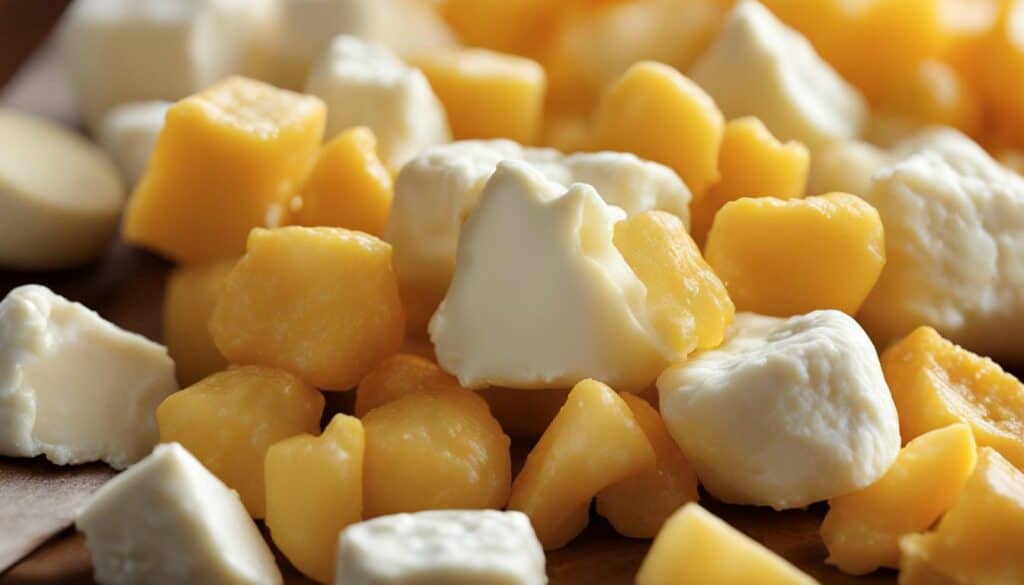
With their protein-packed goodness, cheese curds are a versatile and delicious addition to any diet. Whether enjoyed as a standalone snack or incorporated into dishes like poutine or salads, cheese curds provide a satisfying way to meet your protein needs. So go ahead, indulge in this squeaky, protein-rich delight and reap the benefits it has to offer!
Essential Vitamins and Minerals
Cheese curds are not only tasty but also a great way to boost your intake of essential vitamins and minerals. These delectable morsels offer a range of nutrients that can support overall health and well-being. Whether you’re looking to enhance your calcium intake or increase your vitamin B12 levels, cheese curds have got you covered.
One of the key nutrients found in cheese curds is calcium. Calcium plays a vital role in maintaining strong bones and teeth, and it also supports proper nerve function. Just one serving of cheese curds can provide a significant portion of your daily calcium needs.
In addition to calcium, cheese curds are also rich in vitamin B12. This essential vitamin is crucial for producing red blood cells and maintaining a healthy nervous system. Incorporating cheese curds into your diet can help ensure that you’re meeting your vitamin B12 requirements.
Furthermore, cheese curds contain selenium, a mineral that acts as a powerful antioxidant in the body. Selenium helps protect cells from damage caused by oxidative stress and supports a healthy immune system.
To visualize the nutritional content of cheese curds, take a look at the following table:
As you can see, cheese curds pack a nutritional punch. They offer a substantial amount of protein, which is essential for repairing and building muscles. Additionally, they provide various vitamins and minerals that support overall health and vitality.
So, if you’re looking for a delicious and nutritious snack, consider reaching for a handful of cheese curds. Not only will you satisfy your taste buds, but you’ll also be nourishing your body with essential vitamins and minerals.
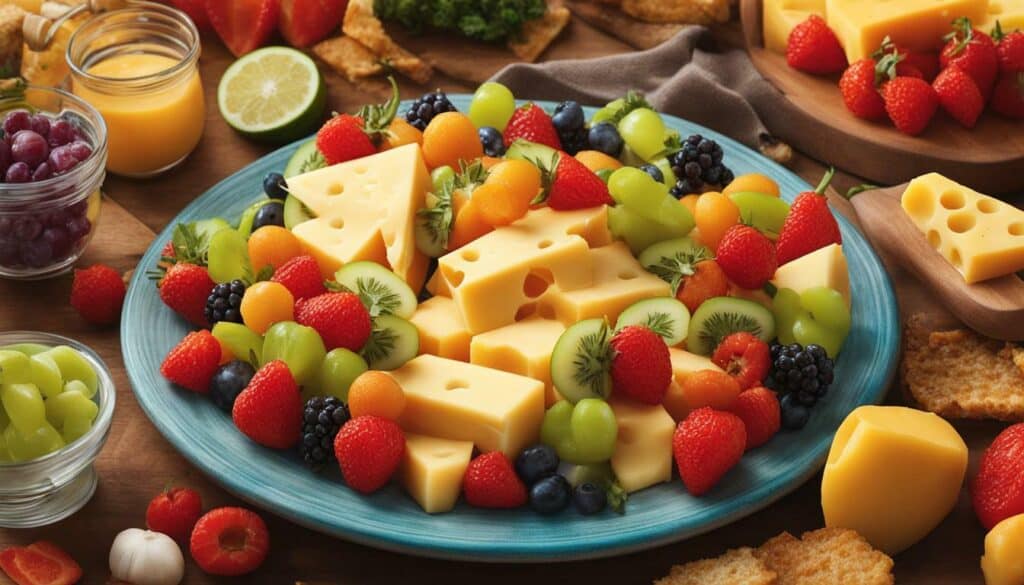
“Cheese curds are a perfect source of calcium, vitamin B12, and selenium. Incorporating them into your diet can be a tasty way to meet your nutritional needs.”
The Health Benefits of Cheese Curds
When it comes to health benefits, cheese curds have a lot to offer beyond just their delicious taste. These squeaky morsels are packed with essential nutrients that can contribute to overall well-being. From protein to vitamins and minerals, cheese curds offer a range of advantages for those looking to indulge in a healthy treat.
First and foremost, cheese curds are a great source of protein. Protein is essential for muscle repair and growth, making cheese curds an excellent choice for active individuals or those looking to increase their protein intake. Additionally, cheese curds are rich in calcium, which is crucial for maintaining strong bones and teeth. They also contain vitamin B12, which is essential for the production of red blood cells and the proper functioning of the nervous system.
But the benefits don’t stop there. Cheese curds are also a good source of selenium, a powerful antioxidant that helps protect cells from damage and supports a healthy immune system. They also contain other vitamins and minerals, such as phosphorus, zinc, and vitamin A, which all play important roles in maintaining good health.
To fully enjoy the health benefits of cheese curds, it’s important to incorporate them into a balanced diet. While they are nutritious, it’s essential to consume them in moderation, as they are also high in calories and fat. Pairing cheese curds with salads or fruits can help create a well-rounded meal and reduce the overall calorie content. It’s all about finding a balance that works for you and your dietary goals.
So, the next time you’re looking for a tasty snack, consider reaching for some cheese curds. With their wide range of health benefits and delicious flavor, they make for a guilt-free indulgence that you can feel good about.
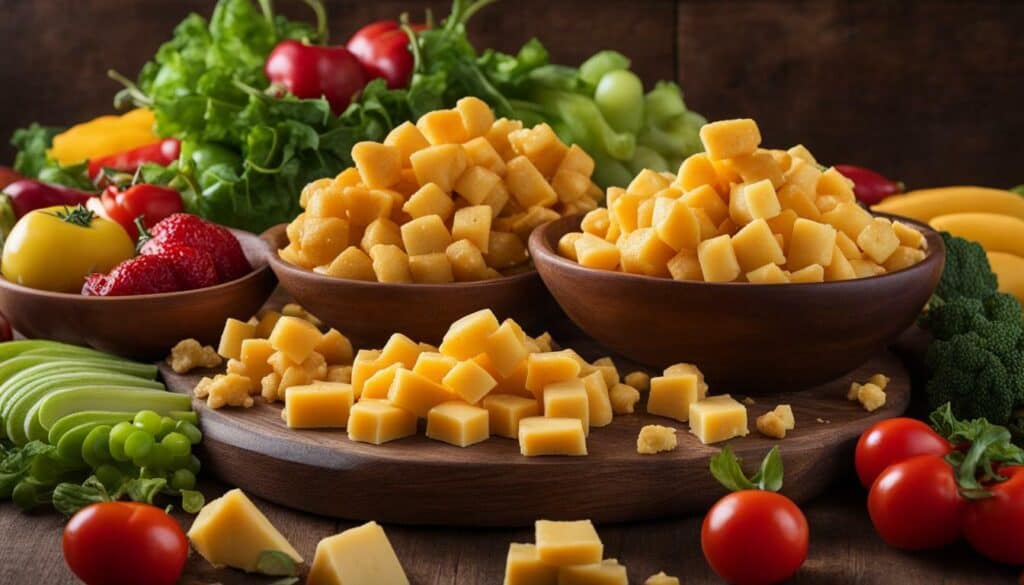
“Cheese curds are not only a delicious treat, but they also offer a wealth of nutritional benefits. From their high protein content to their abundance of vitamins and minerals, cheese curds can contribute to overall health and well-being.”
– Nutritionist Jane Smith
Incorporating Cheese Curds in Your Diet
Looking for delicious ways to incorporate cheese curds into your diet? Here are some ideas to get you started:
1. Salads: Add a handful of cheese curds to your favorite salad for an extra burst of flavor and texture. The squeaky, slightly salty curds pair perfectly with fresh greens, cherry tomatoes, and a tangy vinaigrette.
2. Snack Packs: Create a snack pack by combining cheese curds with sliced apples, grapes, and whole-grain crackers. This nutritious and portable snack is a great option for when you’re on the go or need a quick pick-me-up.
3. Pizza Topping: Sprinkle cheese curds on top of your homemade pizza for a unique twist. As the pizza bakes, the curds will melt and develop a deliciously gooey texture that complements the other toppings.
| Cheese Curd and Apple Snack Pack | Ingredients |
|---|---|
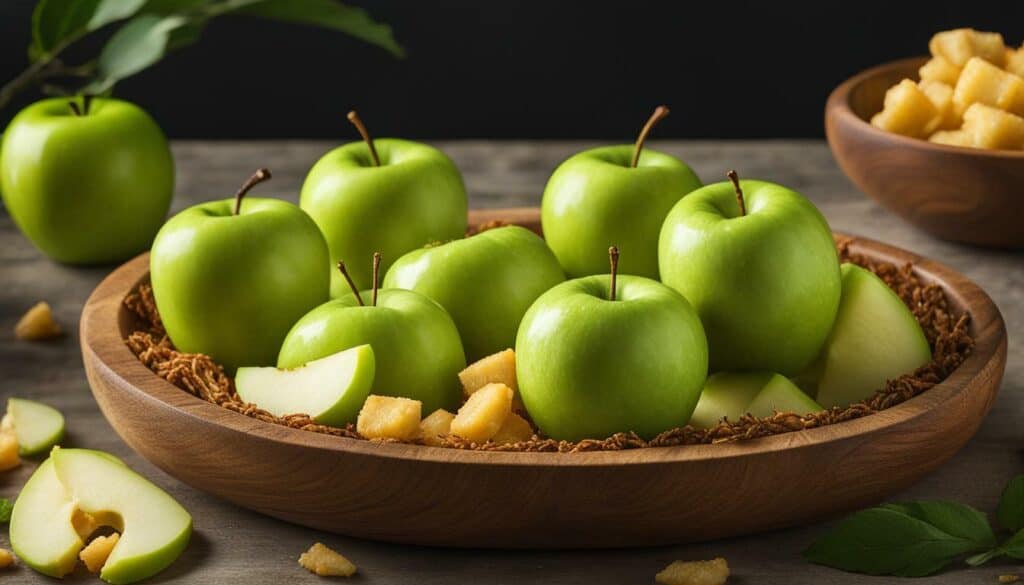 |
|
“Cheese curds are a versatile ingredient that can add a burst of flavor and texture to a variety of dishes.”
4. Pesto Salad: Make a refreshing pesto salad by combining cheese curds with fresh basil, pine nuts, garlic, olive oil, and a squeeze of lemon juice. Toss it with your favorite pasta or serve it as a side dish.
5. Cheese Curd Nuggets: Get creative in the kitchen by making cheese curd nuggets. Simply coat the curds in a mixture of breadcrumbs and spices, then bake them in the oven until golden brown. Serve them as an appetizer or snack with your favorite dipping sauce.
Remember, while cheese curds are a delicious addition to your diet, it’s important to enjoy them in moderation. They contain fats and calories, so it’s best to pair them with lighter options like salads or fruits as sides. With these ideas, you can savor the unique flavor and texture of cheese curds while maintaining a balanced and nutritious diet.
Where to Find Cheese Curds
Ready to get your hands on some fresh and squeaky cheese curds? Here’s where you can find them:
- Local cheese producers: Look for nearby dairy farms or artisanal cheese makers who specialize in crafting high-quality cheese curds. These local producers often offer a wide range of flavors and variations to satisfy every cheese lover’s palate.
- Farm shops and markets: Explore your local farmers’ markets or farm shops, where you can find a variety of locally sourced products, including cheese curds. These establishments are often committed to supporting local farmers and artisans, ensuring the freshest and most authentic cheese curds.
- Specialty cheese stores: Visit specialty cheese stores that focus on offering a wide selection of cheeses from around the world. These stores often carry cheese curds, allowing you to discover unique flavors and textures.
- Online retailers: Take advantage of the convenience of online shopping by browsing reputable online retailers like Amazon. They offer a wide range of cheese curd options, allowing you to explore different brands and flavors from the comfort of your own home.
Whether you prefer to shop locally or take advantage of online options, finding cheese curds is easier than ever. Get ready to enjoy these delectable treats in a variety of dishes and recipes!

Looking for a creative and mouth-watering way to enjoy cheese curds? Try this simple recipe for Cheese Curd Stuffed Meatballs:
| Ingredients: | Instructions: |
|---|---|
|
|
These cheese curd stuffed meatballs are sure to impress your family and friends with their gooey surprise in the center. Enjoy them as an appetizer or main course for a flavorful and cheesy delight!
Indulge Wisely: Heart-Healthy Options
While cheese curds can be a delicious and nutritious snack, it’s important to be mindful of your heart health. Cheese curds are known for their rich flavor and satisfying texture, but some preparations can be high in sodium and saturated fats, which can increase the risk of cardiovascular issues. However, there are plenty of heart-healthy options to enjoy these delectable cheese morsels without compromising your well-being.
One heart-healthy way to incorporate cheese curds into your diet is by pairing them with a fresh salad. The combination of crisp greens, vibrant vegetables, and the creamy tanginess of cheese curds creates a satisfying and nutritious meal. You can also add a protein boost to your salad by topping it with grilled chicken or tofu. The cheese curds add a burst of flavor and a pleasant squeak with each bite.
Another heart-healthy option is to enjoy cheese curds alongside a variety of fruits. The natural sweetness of fruits balances the savory cheesiness of cheese curds, creating a harmonious flavor profile. Consider pairing cheese curds with grapes, apple slices, or fresh berries for a delightful and heart-friendly snack. This combination provides a good balance of vitamins, minerals, and antioxidants.
| Heart-Healthy Options | Benefits |
|---|---|
| Salads with cheese curds | Low in saturated fats, high in fiber and antioxidants |
| Fruit pairings with cheese curds | Good source of vitamins, minerals, and antioxidants |
When enjoying cheese curds, it’s essential to be mindful of portion sizes. Moderation is key to maintaining a balanced diet and a healthy heart. By opting for heart-healthy pairings and practicing portion control, you can savor the unique flavors and textures of cheese curds while taking care of your cardiovascular health.
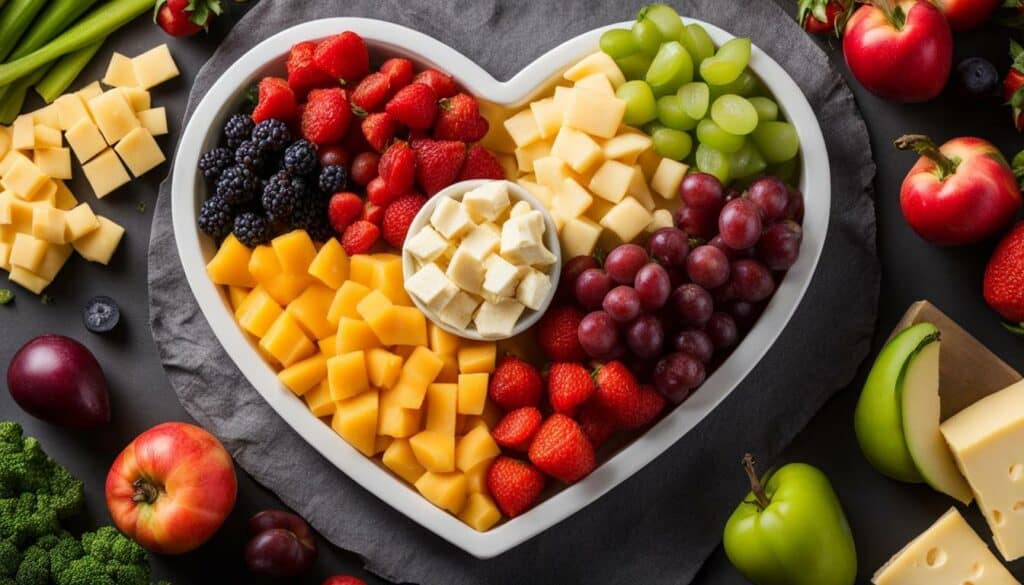
Ready to take your cheese curd experience to the next level? Try these mouthwatering recipes that will satisfy all your cheesy cravings. Whether you’re looking for a quick snack or a hearty meal, these recipes are sure to impress your taste buds and leave you craving for more.

Originating from Canada, this classic dish combines the irresistible flavors of cheese curds, gravy, and crispy French fries. To make this cheesy delight, simply top a bed of golden fries with cheese curds and smother it all with rich, flavorful gravy. The heat from the gravy melts the curds, creating a gooey, heavenly combination. It’s the ultimate comfort food that will leave you wanting seconds!
Fried Breaded Cheese Curds
Elevate your cheese curd game with this indulgent appetizer. Start by coating the curds in a seasoned breading mixture and frying them until golden and crispy. The result? A delightful combination of warm, melty cheese with a satisfying crunch. Serve these cheesy bites with your favorite dipping sauce for a crowd-pleasing snack that will disappear in no time.
Cheese Curd Salad with Pesto Dressing
For a healthier option that doesn’t compromise on taste, try this refreshing salad featuring cheese curds tossed in a vibrant pesto dressing. Combine fresh greens, cherry tomatoes, cucumber slices, and cheese curds, then drizzle with a homemade pesto dressing for a burst of flavor. The creamy curds add a delightful texture and a slight tang to this light and satisfying salad.
These recipes are just the beginning. Feel free to get creative and experiment with different flavors and ingredients to suit your personal taste. Whether you’re a cheese curd enthusiast or just beginning to discover their incredible versatility, these recipes are guaranteed to leave you craving more of these delectable, squeaky morsels.
Conclusion
Cheese curds offer a tantalizing blend of flavor and nutrition, making them a delightful addition to any diet. So go ahead, savor the goodness!
As we’ve explored in this article, cheese curds are not only a delicious treat but also provide a wealth of nutritional benefits. High in protein, calcium, vitamin B12, and selenium, they can play a valuable role in maintaining good health. Whether you’re looking to build muscle, support bone health, or boost your immune system, cheese curds have got you covered.
But remember, moderation is key. While cheese curds are a nutritious indulgence, it’s important to be mindful of your overall calorie and fat intake. Opting for healthier options, like enjoying cheese curds alongside a fresh salad or pairing them with fruits, can help you maintain a heart-healthy diet.
When it comes to incorporating cheese curds into your meals, the possibilities are endless. From classic poutine to homemade baked cheese curds, there are countless recipes to explore. You can find cheese curds at local cheese producers, farm shops, markets, specialty cheese stores, and even online retailers like Amazon. So go out and discover the best cheese curds available, and get creative in the kitchen!
FAQ
Q: What are cheese curds?
A: Cheese curds are a fresh, nutrient-rich cheese product that is formed during the early stages of the cheesemaking process. They have a milder flavor and a firm, rubbery texture, and they make a squeaky noise when bitten into.
Q: How are cheese curds made?
A: Cheese curds are made by adding pasteurized milk to large vats and adding bacterial starter culture and rennet, which coagulates the milk and separates it into curds and whey. The curds are then pressed and shaped, and salted before being packaged for sale.
Q: What are the nutritional values of cheese curds?
A: Cheese curds are high in protein, calcium, vitamin B12, and selenium. They are also a good source of other vitamins and minerals.
Q: Where can I buy cheese curds?
A: You can buy cheese curds from local cheese producers, farm shops, markets, specialty cheese stores, and online retailers like Amazon.
Q: How long do cheese curds last?
A: Cheese curds are meant to be eaten quickly as they lose their texture and flavor after a few days.
Q: How can I use cheese curds in cooking?
A: Cheese curds can be used in various dishes, such as poutine, deep-fried breaded cheese curds, marinated and baked cheese curds, seasoned and baked cheese curds, and as a pizza topping or in a pesto salad.
Q: Are deep-fried cheese curds healthy?
A: Deep-fried cheese curds are high in sodium and saturated fats, which can increase the risk of cardiovascular issues. It is advised to opt for healthier options like salads or fruits as sides instead.
How Does Philadelphia Cream Cheese Compare to Cheese Curds in Terms of Nutrition?
Unraveling philadelphia cream cheese nutrition facts brings to light the comparison between this popular spread and cheese curds. While Philadelphia Cream Cheese offers a rich and creamy texture, it contains higher saturated fat and sodium compared to cheese curds. Cheese curds, being in their natural form, usually have lower fat and sodium content. It’s crucial to consider these nutritional aspects when choosing between the two options.

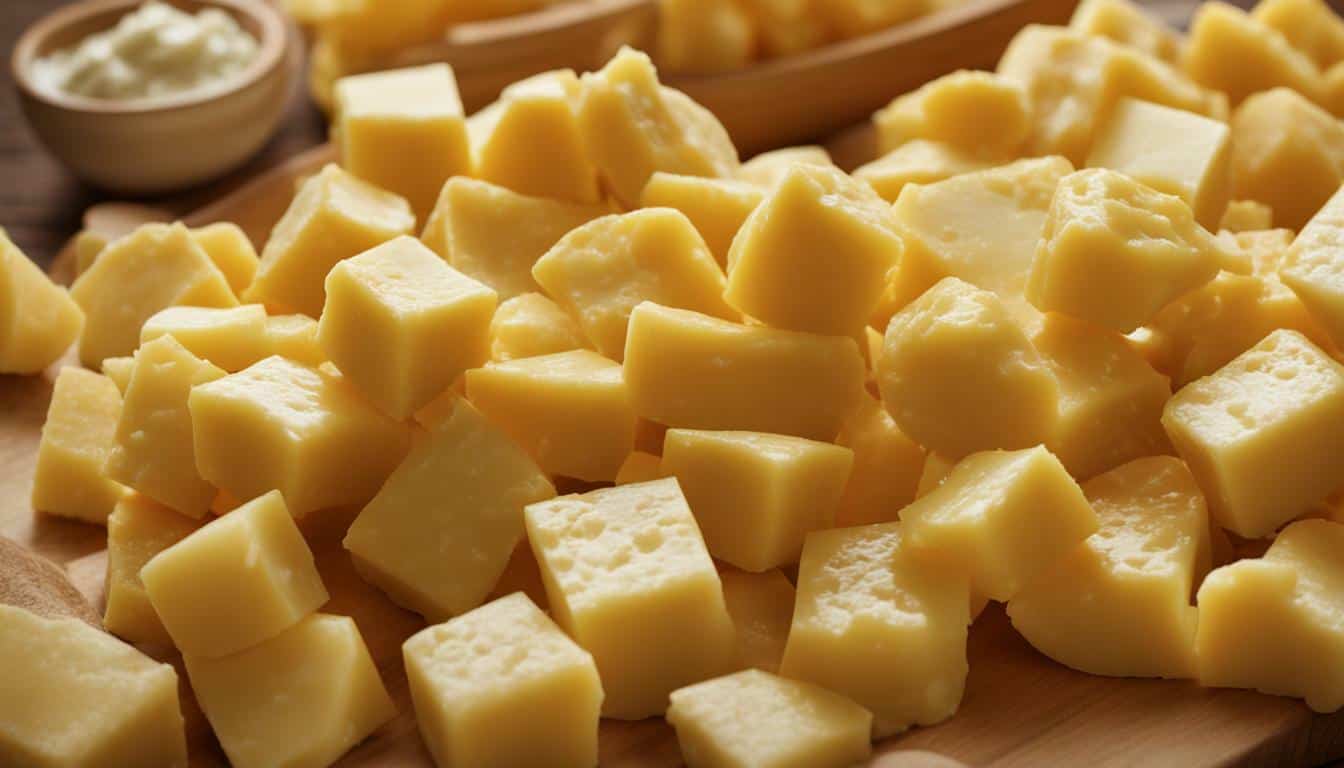



Leave a Reply